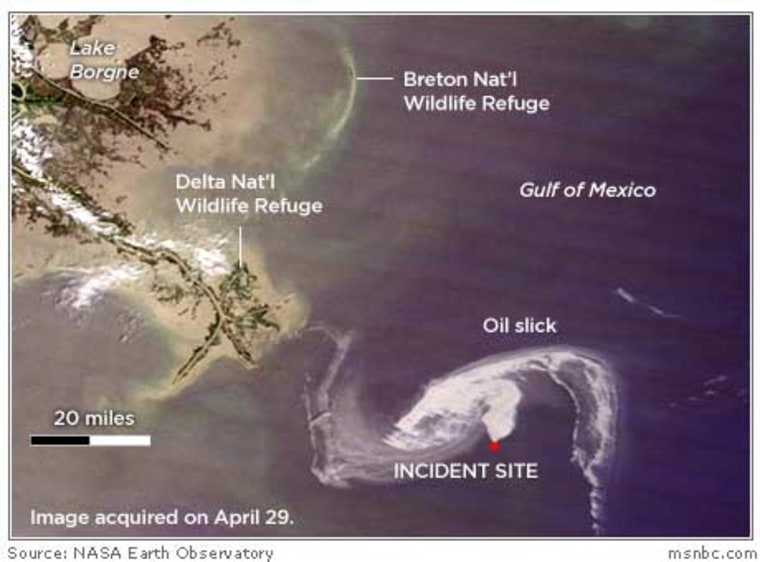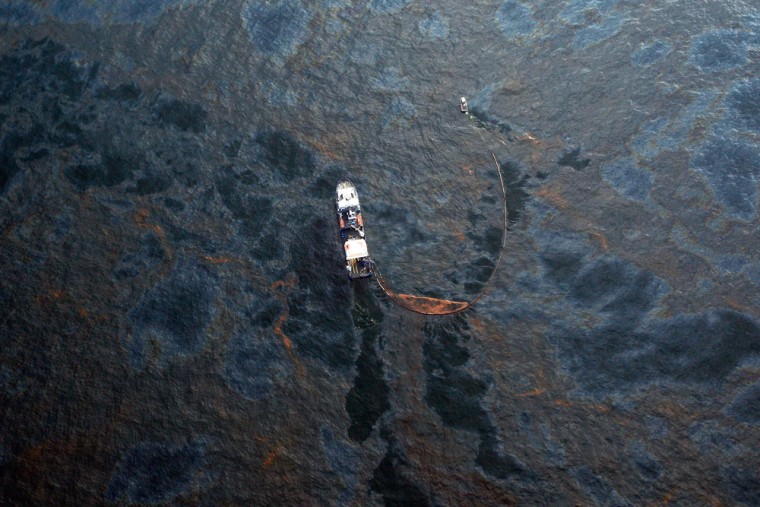An oil spill that threatened to eclipse even the Exxon Valdez disaster spread out of control with a faint sheen washing ashore along the Gulf Coast Thursday night as fishermen rushed to scoop up shrimp and crews spread floating barriers around marshes.
The spill was bigger than imagined — five times more than first estimated — and closer. Faint fingers of oily sheen were reaching the Mississippi River delta, lapping the Louisiana shoreline in long, thin lines.
"It is of grave concern," David Kennedy of the National Oceanic and Atmospheric Administration, told The Associated Press. "I am frightened. This is a very, very big thing. And the efforts that are going to be required to do anything about it, especially if it continues on, are just mind-boggling."
The oil slick could become the nation's worst environmental disaster in decades, threatening hundreds of species of fish, birds and other wildlife along the Gulf Coast, one of the world's richest seafood grounds, teeming with shrimp, oysters and other marine life. Thicker oil was in waters south and east of the Mississippi delta about five miles offshore.
The leak from the ocean floor proved to be far bigger than initially reported, contributing to a growing sense among many in Louisiana that the government failed them again, just as it did during Hurricane Katrina. President Barack Obama dispatched Cabinet officials to deal with the crisis.
Louisiana Gov. Bobby Jindal declared a state of emergency Thursday so officials could begin preparing for the oil's impact. He said at least 10 wildlife management areas and refuges in his state and neighboring Mississippi are in the oil plume's path.
The declaration also noted that billions of dollars have been invested in coastal restoration projects that may be at risk. He also asked the federal government if he could call up 6,000 National Guard troops to help.
‘They lied to us’
Cade Thomas, a fishing guide in Venice, worried that his livelihood will be destroyed. He said he did not know whether to blame the Coast Guard, the federal government or oil company BP PLC.
"They lied to us. They came out and said it was leaking 1,000 barrels when I think they knew it was more. And they weren't proactive," he said. "As soon as it blew up, they should have started wrapping it with booms."
The Coast Guard worked with BP, which operated the oil rig that exploded and sank last week, to deploy floating booms, skimmers and chemical dispersants, and set controlled fires to burn the oil off the water's surface.

The company has requested more resources from the Defense Department, especially underwater equipment that might be better than what is commercially available. A BP executive said the corporation would "take help from anyone."
Government officials said the blown-out well 40 miles offshore is spewing five times as much oil into the water as originally estimated — about 5,000 barrels, or 200,000 gallons, a day.
At that rate, the spill could eclipse the worst oil spill in U.S. history — the 11 million gallons that leaked from the grounded tanker Exxon Valdez in Alaska's Prince William Sound in 1989 — in the three months it could take to drill a relief well and plug the gushing well 5,000 feet underwater on the sea floor.
Ultimately, the spill could grow much larger than the Valdez because Gulf of Mexico wells tap deposits that hold many times more oil than a single tanker.
Doug Suttles, chief operating officer for BP Exploration and Production, had initially disputed the government's larger estimate. But he later acknowledged on NBC's "Today" show that the leak may be as bad as federal officials say. He said there was no way to measure the flow at the seabed, so estimates have to come from how much oil rises to the surface.
‘There is no way to stop it’
Mike Brewer, 40, who lost his oil spill response company in the devastation of Hurricane Katrina nearly five years ago, said the area was accustomed to the occasional minor spill. But he feared the scale of the escaping oil was beyond the capacity of existing resources.
"You're pumping out a massive amount of oil. There is no way to stop it," he said.
An emergency shrimping season was opened to allow shrimpers to scoop up their catch before it is fouled by oil. And shrimpers were being lined up to use their boats as makeshift skimmers in the shallows.
This murky water and the oysters in it have provided a livelihood for three generations of Frank and Mitch Jurisich's family in Empire, La.
Now, on the open water just beyond the marshes, they can smell the oil that threatens everything they know and love.
"Just smelling it, it puts more of a sense of urgency, a sense of fear," Frank Jurisich said.
The brothers hope to get all the oysters they can sell before the oil washes ashore. They filled more than 100 burlap sacks Thursday and stopped to eat some oysters. "This might be our last day," Mitch Jurisich said.
Without the fishing industry, Frank Jurisich said the family "would be lost. This is who we are and what we do."
Tension growing
As dawn broke Thursday in the oil industry hub of Venice, about 75 miles from New Orleans and not far from the mouth of the Mississippi River, crews loaded an orange oil boom aboard a supply boat at Bud's Boat Launch. There, local officials expressed frustration with the pace of the government's response and the communication they were getting from the Coast Guard and BP officials.
"We're not doing everything we can do," said Billy Nungesser, president of Plaquemines Parish, which straddles the Mississippi River at the tip of Louisiana.
Tension was growing in towns like Port Sulphur and Empire along Louisiana Highway 23, which runs south of New Orleans along the Mississippi River into prime oyster and shrimping waters.
Companies like Chevron and ConocoPhillips have facilities nearby, and some residents are hesitant to criticize BP or the federal government, knowing the oil industry is as much a staple here as fishing.
"I don't think there's a lot of blame going around here. People are just concerned about their livelihoods," said Sullivan Vullo, who owns La Casa Cafe in Port Sulphur.
A federal class-action lawsuit was filed late Wednesday on behalf of two commercial shrimpers from Louisiana, Acy J. Cooper Jr. and Ronnie Louis Anderson.
The suit seeks at least $5 million in compensatory damages plus an unspecified amount of punitive damages against Transocean, BP, Halliburton Energy Services Inc. and Cameron International Corp.
‘We're really disgusted’
In Buras, La., where Hurricane Katrina made landfall in 2005, the owner of the Black Velvet Oyster Bar & Grill couldn't keep his eyes off the television. News and weather shows were making projections that oil would soon inundate the coastal wetlands where his family has worked since the 1860s.
It was as though a hurricane was approaching, maybe worse.
"A hurricane is like closing your bank account for a few days, but this here has the capacity to destroy our bank accounts," said Byron Marinovitch, 47.
"We're really disgusted," he added. "We don't believe anything coming out of BP's mouth."
Signs of the 2005 hurricane are still apparent here: There are schools, homes, churches and restaurants operating out of trailers, and across from Marinovitch's bar is a wood frame house abandoned since the storm.
A fleet of boats working under an oil industry consortium has been using booms to corral and then skim oil from the surface.
BP conducted a test burn on Wednesday, but abandoned a plan to set fire to more oil after weather conditions deteriorated. The attempt to burn some of the oil came after crews operating submersible robots failed to activate a shut-off device that would halt the flow.
Adm. Mike Mullen, chairman of the Joint Chiefs of Staff, was briefed Thursday on the issue, said his spokesman, Capt. John Kirby. But Kirby said the Defense Department has received no request for help, nor is it doing any detailed planning for any mission on the oil spill.
Obama dispatched Homeland Security Secretary Janet Napolitano, Interior Secretary Ken Salazar and Environmental Protection Agency administrator Lisa Jackson to help with the spill. The president said the White House would use "every single available resource" to respond.
Obama has directed officials to aggressively confront the spill, but the cost of the cleanup will fall on BP, White House spokesman Nick Shapiro said.
